Many folks love the full-bodied and thick texture of French press coffee but many others complain about having grittiness or a high amount of Cafestol in their French Press coffee, and they certainly don’t like it.
The simple way to reduce that grittiness is to make French Press with Paper Filter.
In this article, I will guide you on how to filter French Press Coffee, what type of paper filters are best, and how to use them properly.
What types of filters are used with the French Press?
Stainless Steel filters
Most French Press Coffee Makers consist of a jar made of glass or metal, a plunger that fits into the French Press Jar, and a stainless-steel mesh or filter.
This stainless-steel mesh or filter is attached to the plunger of the French Coffee maker, which keeps most of the coffee grounds away from your cup of coffee.
But these mesh filters allow some finer coffee particles to pass through, which gives French Press coffee its signature gritty texture.
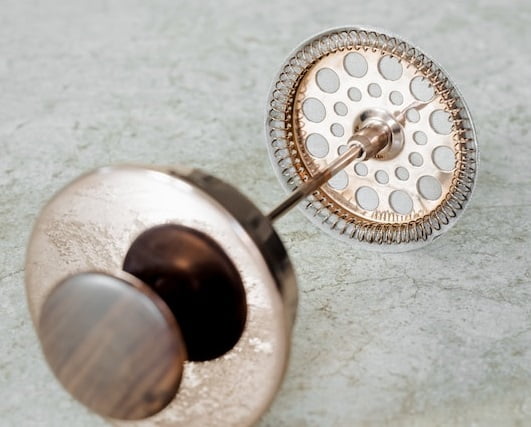
Paper filters
Paper filters effectively filter out all the finer coffee particles and give you a clean smooth coffee drink free of any coffee sediments.
Paper filters are good to use if you are entirely against the bitterness but they can also mute the flavorful coffee oils that French press coffee is known for.
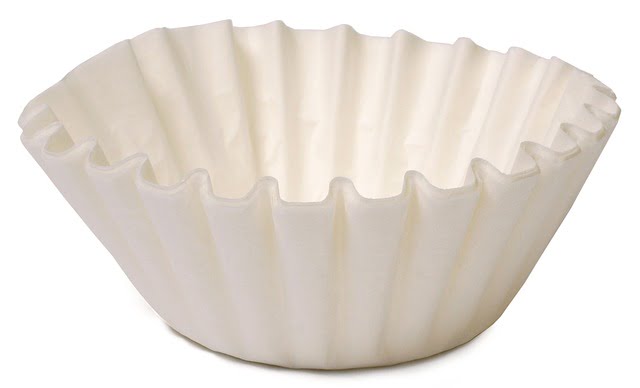
As an Amazon Associate, I earn commission from qualifying purchases.
3 hacks to use Paper Filters with French Press Coffee
There are three methods of filtering French Press coffee with paper filters.
- The first one is to cut the paper filter precisely to match the size of the plunger of the French Press coffee maker and place it in between the plates of the plunger.
Remember to cut the paper filter that exactly matches the size of the plates. Because if it’s too large, it will cause problems in plunging and if it is too small it will let the coffee grounds through the sides. You can do it easily by placing the plate above the paper filter and cutting it with a blade or sharp knife.
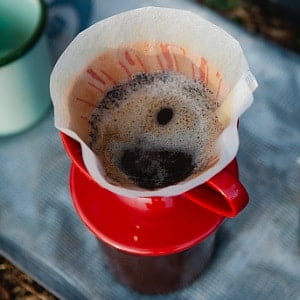
- The second one is to place the paper filter above your cup or some beaker if you are making more than one cup. Put the rubber band around the filter and pour the coffee slowly from the French Press into the beaker.
This paper filter will filter out the grounds that manage to escape through the mesh screen of the French Press Coffee maker.
You can buy round paper filters for French Press from this link
- The third option is to buy paper filters designed specifically for French Press Coffee makers. Simply insert the disposable filter into the French press carafe, add the ground coffee, and pour boiling water over it. Just like with traditional French press brewing, allow the coffee to steep for four minutes, then gently press down the plunger. Once the coffee is poured, simply discard the paper filter.
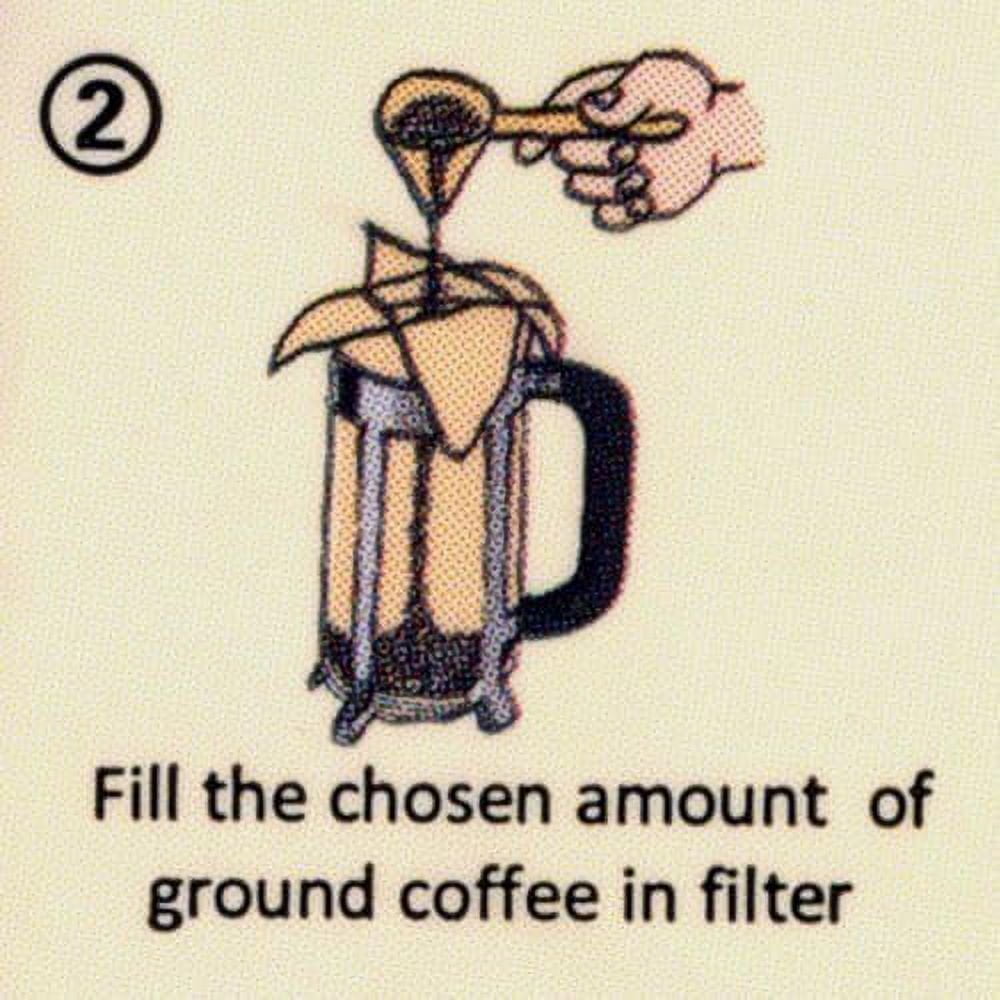
I love this method as it delivers a completely sediment-free cup of coffee while significantly simplifying the cleaning process for your French press. The paper filter effectively traps all coffee grounds, leaving you with the effortless task of simply rinsing the French press.
Looking for an Electric kettle to heat water? Check our latest guide on the best electric kettles for French Press
Should you filter French press coffee?
Personally, I never prefer to filter French Press coffee, as paper filters tend to remove some of the rich, oily flavors that contribute to its full-bodied character and thicker texture.
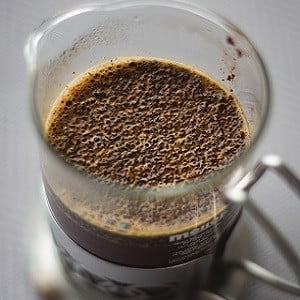
However, you can use a paper filter if you love a completely clean brew without any sediments. The paper filters will effectively remove any fine coffee particles and give you a clean and smooth coffee drink.
Also, you need to know that there is a high amount of Cafestol in coffee oils that increases the level of Cholesterol in the human body, and it is very dangerous for people with heart disease or aged persons.
If you’re a frequent French press coffee drinker, consuming more than four cups per day, consider using paper filters to reduce the intake of cafestol, as it can cause health issues.
Paper Filters can effectively remove all the Cafestol from the French Press Coffee!
You might have heard that French Press is bad for health. I have conducted detailed research on this topic. Read here: Is French Press coffee good or bad?
How to minimize grittiness with a French press?
As discussed above, if you drink only two cups of French Press per day and have no heart problems, you don’t have to worry about Cafestol.
And you don’t have to use a paper filter as it will remove all the oils making the taste of your French Press Coffee very dull.
But there is still one problem! How to reduce sediments in French Press without using paper filters as smaller grains easily escape through the metal filter of French Press.
Here are some tips to make your French Press coffee less muddy without using paper filters:
1- Always use a coarse grind for French Press coffee. The metal strainers in French Press can effectively filter out the coarse grounds but the fine grounds can easily escape through it to make your drink gritty.
2- Never use pre-ground coffee for preparing French Press coffee as mostly the grind size of pre-ground coffee is fine or medium fine which is certainly not suitable. Even if you find the coarse grinds they will be very inconsistent in size.
3- Always steep the French Press for adequate time so that all the coffee grounds completely settle at the bottom. Recommended steeping time for the French press is 4 minutes, never push the plunger before that!
4- After the steeping time of 4 minutes, Skim off the foamy layer on the top of your French Press brew with a spoon. This will remove fine coffee particles trapped in the foam and make your drink cleaner.
5- Press the plunger slowly and evenly. Plunging too fast can stir up grit from the bottom.
6- Choose a French Press with nice filtration: Investing in a French press with a high-quality, multi-layered mesh filter can significantly reduce sediment and grittiness in your coffee. Look for models featuring fine, tightly woven stainless steel filters with multiple layers or additional micro-filters that effectively trap fine coffee particles.
Espro French Presses offers the best filtration with their patented double micro-filter, delivering smooth, grit-free coffee and stopping extraction to prevent bitterness—but they come at a higher price. The Belware French Press is a solid pick if you want something budget-friendly. It features a 4-level filtration system, including dual mesh and plate filters, for a clean, flavorful brew.

Final Thoughts
While many coffee lovers prefer the unfiltered richness of French press coffee, the presence of cafestol, a compound found in coffee oils, raises concerns about its impact on cholesterol levels.
Research has shown that French press coffee contains significantly higher levels of cafestol compared to other brewing methods.
Therefore, for those individuals with heart health or cholesterol concerns, filtering French press is strongly recommended to minimize cafestol intake and protect cardiovascular well-being.
faqs
Is French press coffee bad for cholesterol?
French Press Coffee contains the highest amount of Cafestol which is really bad for cholesterol patients. But if you use a paper filter with a French Press Coffee maker, you will not have to worry about Cafestol as paper filters will remove all the cafestol.
What can you use instead of filter paper?
Paper towels and napkins can be used instead of paper filters to filter French Press coffee, but they will be less effective.
You must be cautious while using them as the chemicals and dyes in paper towels or napkins may impart flavors or chemicals to coffee.
Related French Press Articles:




where can I buy the insert filter for a 4 cup French roast system.
Thank you
Hey Barry, here you can buy Caffi Paper Filters for 4 to 8 Cup French Press coffee makers
Feels like cheating on my French press. Isn’t the oil part of the charm? Maybe good for my coffee-sensitive friends though.
Totally agree with you! The thick body of French Press with all flavors all oils and a little bit of grittiness is the real thing. But it’s not for all, I guess!